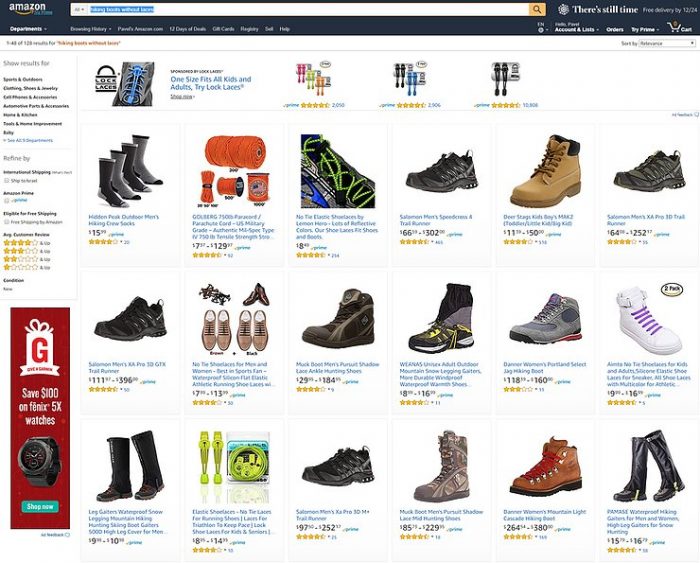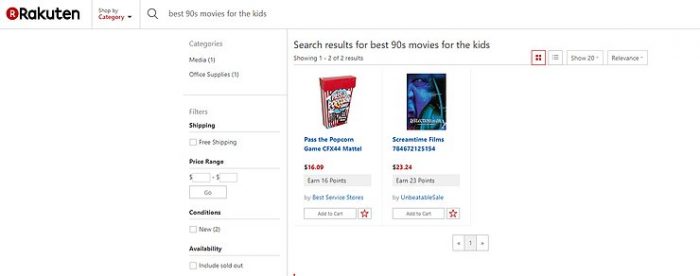The data you are looking for should be in the first 3 to 5 results. Didn't find it? Adjust your query and repeat the process. You will find what you need in no time. The reality on the ground is slightly more complex. While the majority of users start their journey on a marketplace with a search, according to this Kissmetrics article almost half (47%) of them finalize the journey through some kind of navigation.
Search vs. navigation on marketplaces. Who is winning?

For any techies around the answer to the questions is really simple. In the world of Google using anything but search seems to be pretty redundant. Just write a decent query and 0.46 seconds later get your results back - fast, precise and ordered by relevance.
There are 2 major questions that come up from looking at these results - one why does it happen and two what does it mean for the sellers or marketplaces. Lets start with why it happens.
1. Marketplace search is not sophisticated enough.
Returning relevant results is a complicated task. While Google uses the graphs combined with query interpretation, tons of technology and a few good people to provide us with the most relevant results, most of the marketplaces are not yet there. Most of them use keyword search with stemming and bring back the results that were triggered by the search keywords with some degree of marketplace induced promotional skew. As a result simple queries like - "Canon digital camera" or "Red nike tshirt" work reasonably well, more complicated queries which resemble human question fail miserably.
A query like "hiking boots without laces" on Amazon yield relatively irrelevant results

2. Users don't know how to search
Writing a good search query is not very complicated, but it does require some skill and understanding how the search works. Groomed by Google, users create queries which more and more resemble human questions and get slightly puzzled when a query like "best 90s movies for kids" yields 0 relevant results. Moreover, typos in queries introduce an additional level of complexity and contribute to lower search results recall and subsequent lower conversion to click and to sale. In response to such query the better marketplaces will generate some results, perhaps less relevant but still usable, the weaker ones will return nothing.

3. Search is a hard work
Using search means flexing users' memory and paying a much higher interaction cost by the physical effort of typing. While creating a search query a user needs to pull from his memory what exactly he is searching for, pull out the relevant features, combine all these into a meaningful query and then engage in typing. If the query is unsatisfactory because the query was too narrow or too broad the process has to be repeated with even more significant investment of memory resources - pull more features, recall forgotten features, remove irrelevant features and then type again. It is true that at least the typing part can be helped with autosuggestions, but the more complicated the query becomes the smaller the chance for a relevant autosuggestion.
Interesting information published by the Nielsen Norman group quantifies the success rate of search including the search with multiple attempts. With a well designed search engine and assuming the users are looking for a specific item with a well-defined name, they'll probably be successful. In the conducted tests, users found what they wanted in their first search attempt 64% of the time. And their overall success rate with search was 74%.
The extra 10% success came from users running additional queries. Meaning that the 36% of users who failed their first search succeeded only 28% of the time (10/36 = .28). In other words, the probability of success drops from 64% to 28% when going from an easier to a more difficult search problem.
In contrast browsing, navigation is much easier process for the human user. The relevant features are suggested and simply recalled from the memory and the query typing process is replaced with a few clicks on the navigation bar.
4. Search or navigation is a question of mood
Additional important factor in the users selection between the search and navigation is the state of mind and the initial purpose with which the user reached the site. The user that already has a specific product in mind is much more likely to quickly use the search, find his product and be done with the purchasing process as soon as possible. On the other hand the user that came to a site with no specific agenda in mind and in the mood of "entertainment" is much more likely to browse the site. Interestingly, the total cart value of the latter is likely to be higher than the one of the goal oriented user.
Conclusions
While search technology is undergoing a constant improvement users still widely use both search and navigation. Since the usage patterns are dependent not only on the sufficient technology development, but also on the human behavioural patterns, it looks like both search and navigation are here to stay for some time. While the navigation gets slightly more marginalized, is not going to disappear. For the sellers it means that their data needs to be optimized both for search and navigation. Moreover the optimization of the listing data should take in account the specifics of search and navigation of each of the marketplaces the seller wants to onboard. Proper optimization can almost double the conversion to sale while a lack of thereof may mean loss to competition.




